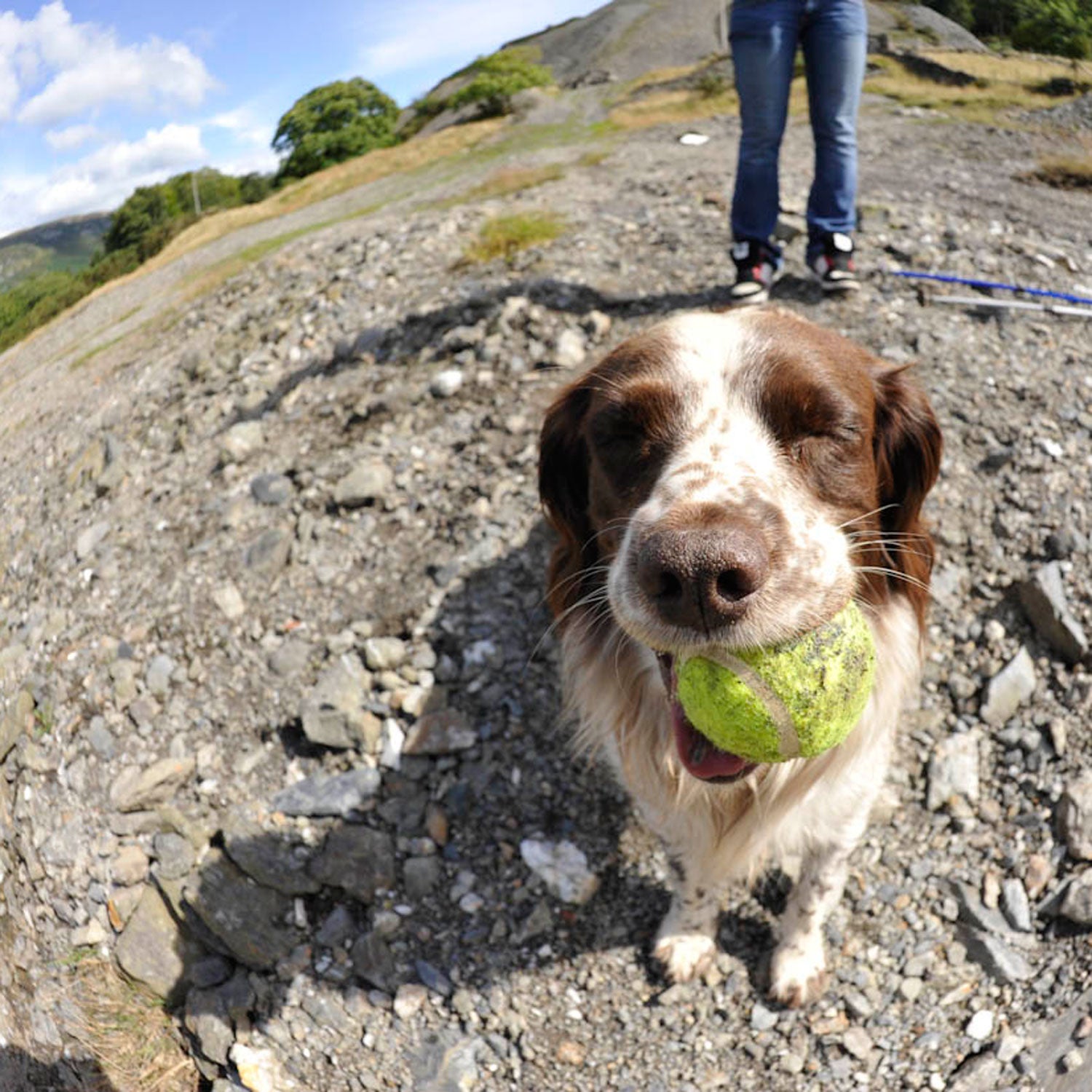Is doggie love real? While it may seem obvious to you that your dog loves you, there’s been very little scientific data that dogs feel the equivalent of love for their owners. Some have argued that humans, who crave love and social bonds, see what they want to see when they ascribe “love” to their dogs, .
Now, from a team of neuroscientists in Japan, comes compelling evidence, released today in the journal Science, that dogs really do love their owners.
In two different experiments, the team, led by Takefumi Kikusui of Azabu University, measured levels of a hormone called oxytocin in response to dogs and owners gazing into each others’ eyes.Â
Scientists have previously shown that touching between dogs and people increases oxytocin levels in both humans and their pets, but this new research expands on these findings and extends it to include wolves that were hand-raised by humans.
The experiments focused on eye gaze. In the first experiment, dogs and their owners were assigned to interact for 30Â minutes. Those dog-owner pairs that engaged in the most in eye contact showed the highest increases in urinary oxytocin levels in both partners. Touching also raised oxytocin levels.Â
When the experiment was repeated with wolf-owner pairs, the wolves rarely eye-gazed, and there was no correlation “with the oxytocin change ratio in either owners or wolves.”Â
Next, the scientists gathered 27 dog-owner volunteer pairs and spritzed either oxytocin or saline into the dogs’ noses. Then they brought individual dogs into a room where a group of people, including the dog’s owner, sat silently under strict instructions not to interact with the dog at all. The dog could touch the owner but not vice-versa. Female dogs that received the oxytocin spray looked into their owner’s eyes far longer than dogs that received saline. Urinary oxytocin increased in the owner of each dog in response, even though they could not interact normally. (Male dogs did not show the same response, but more about that below.) “Thus,” the authors wrote, “oxytocin administration enhances the gazing behavior of female dogs, which stimulates oxytocin secretion in their owners.”
What does all this mean?Â
Well, oxytocin is often oversold as the “love hormone,” but it’s just one of several neurochemicals, such as dopamine, at work in the complex brain circuitry of social bonding. Among its functions, however, oxytocin can trigger a brain region called the nucleus accumbens. That’s the brain’s reward center, which gets activated when we eat something delicious or have sex.
Reward is a key part of social bonding. When a human mother gives birth, she receives a big hit of oxytocin. This helps milk flow but also prompts her to look into her baby’s eyes. Looking into her baby’s eyes lowers the mother’s anxiety and triggers a reward, so it feels good and makes her want to do it again and again. The baby looks back and also experiences a rise in oxytocin and feels the reward. This helps forge mother-infant bonds.
Emory University professor Larry Young (with whom I wrote a book about love, sex, and bonding called ) is one the world’s leading experts on these brain systems. He believes that both human love and dog-owner love are rooted in the evolutionarily ancient mother-infant bonding mechanism.Â
“This is very cool,” Young said. “Now that they looked at wolves raised like dogs by humans, we see the wolves do not show this gazing, so they do not elicit this oxytocin response.” This may have to do with the distribution and numbers of oxytocin receptors on neurons in key brain regions, something Young showed that explained the difference between monogamous and nonmonogamous vole species.Â
“What that suggests is that during co-evolution of humans and dogs, we have selected for behaviors in dogs in which they gaze at us and make eye contact as a form of social communication,” Young said.
Young cautioned about making much of the fact that male dogs given intranasal oxytocin did not respond as powerfully as female dogs. Male dogs clearly bond with owners; the lack of an effect could be due to sample size or the fact that oxytocin has effects in males of other species, such as increased vigilance, that are somewhat different from females.
Evan MacLean, a senior research scientist at Duke University and co-director of the Duke Canine Cognition Center, who wrote a commentary on the Japanese research for Science, agreed. Both he and Young suggested that doggie bonds with people may be an example of neoteny, the retention of youthful traits in adult animals.
“There’s long been a theory that dogs are neotenous wolves,” MacLean said. “We see these traits in wolf puppies, but it disappears as they age. Dogs maintain some of these traits throughout their lives, like tail wagging. They have a baby-like temperament that does a lot to stimulate a parenting-like response.”Â
Dog’s permanent puppydom, speculated Young, may stand in counterpoint to human love losing its excitement. Over time, human lovers, like drug addicts who stop truly enjoying the drug, lose the thrill of being together. But since adult dogs retain their “puppyness,” they’re always excited to see us. Young’s dogs are just as happy to see him come home from work as they were when they first paired up.Â
“My dogs show me love more than my wife does!” he said, joking.
Wolves do not love us even when we raise them. But is this effect in dogs really love?Â
“Yes,” MacLean said. “I mean, to me, if you asked, do dogs love us? I say yes. And do we love dogs? Yes. If love is an enduring social bond between individuals, I think we have that with dogs.”Â
Kikisui agrees. He’s studied formerly abandoned adopted dogs that showed all the elements of PTSD despite receiving proper care and feeding. “This shows that breaking the bond caused impairments,” he stated in an email to ąú˛úłÔąĎşÚÁĎ. “I personally think that dogs can love the owner.” Â
is a writer and author based in California and a frequent contributor to ąú˛úłÔąĎşÚÁĎ magazine. His most recent book is , written with neuroscientist Larry Young. Follow him on Twitter at .


